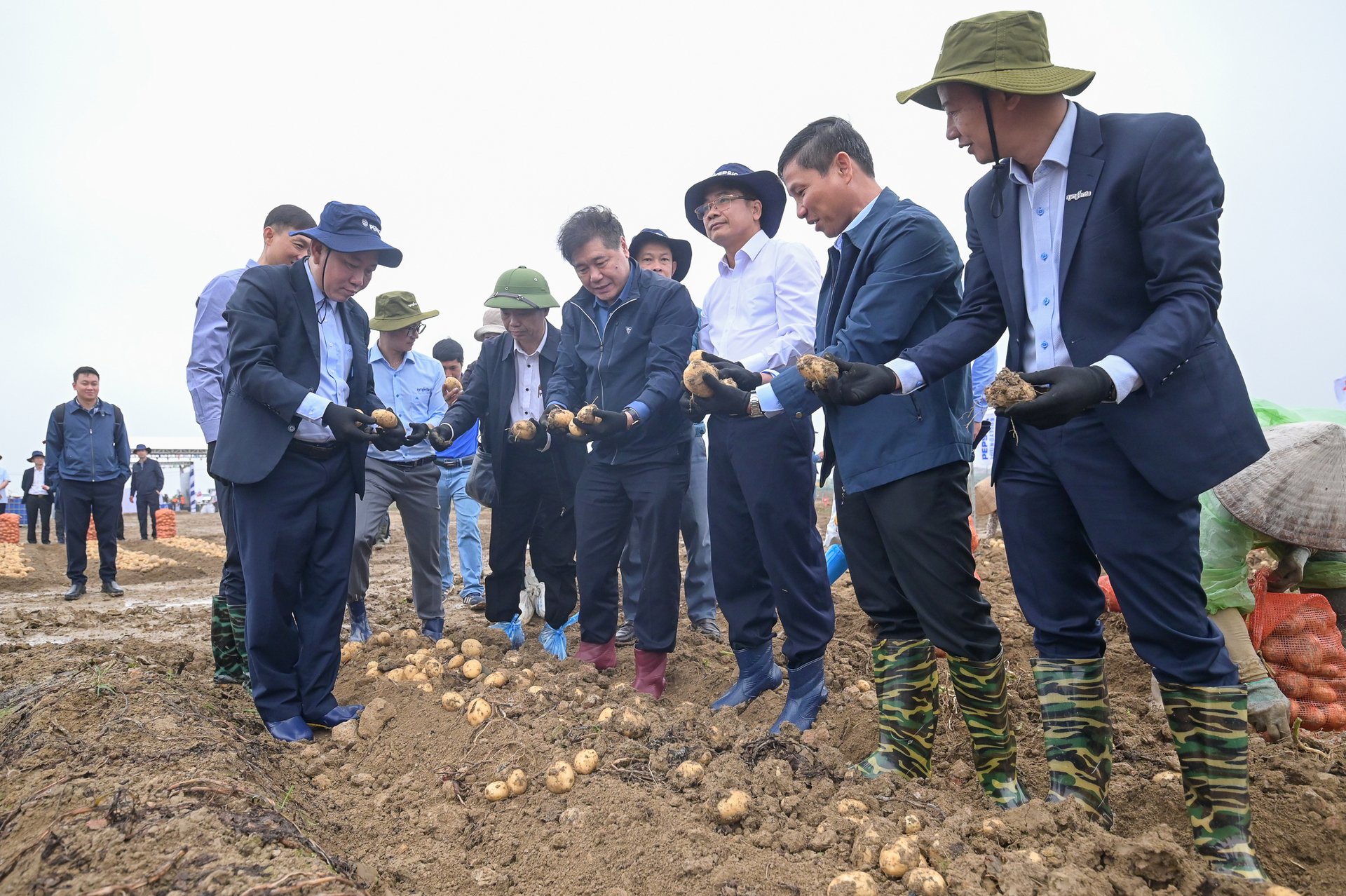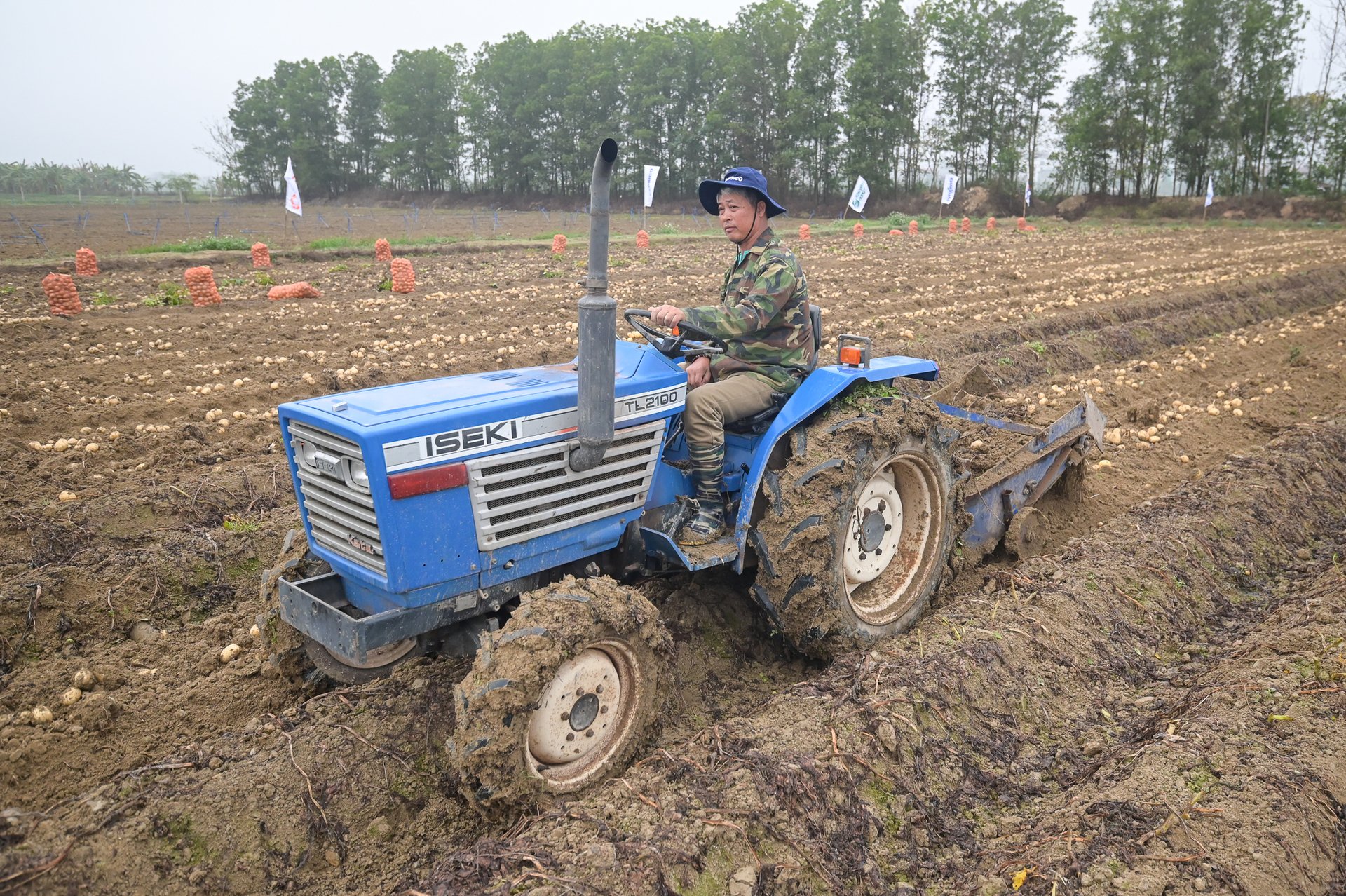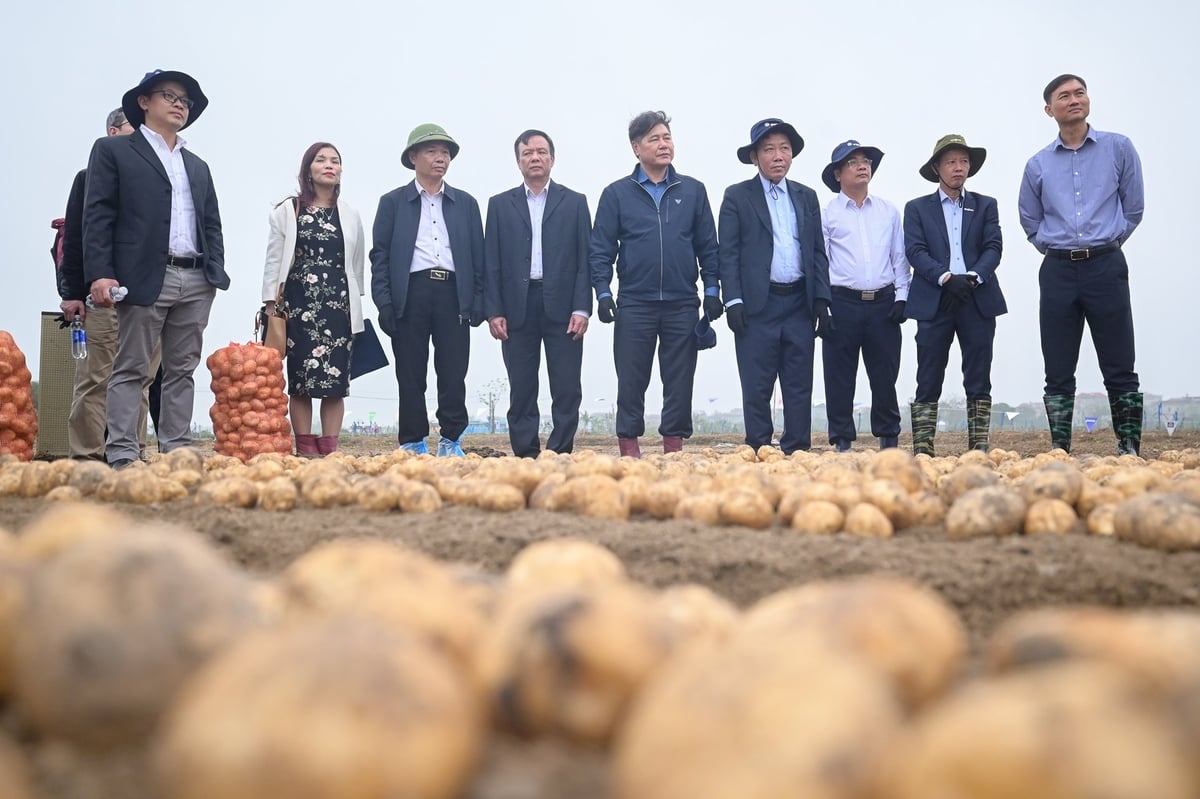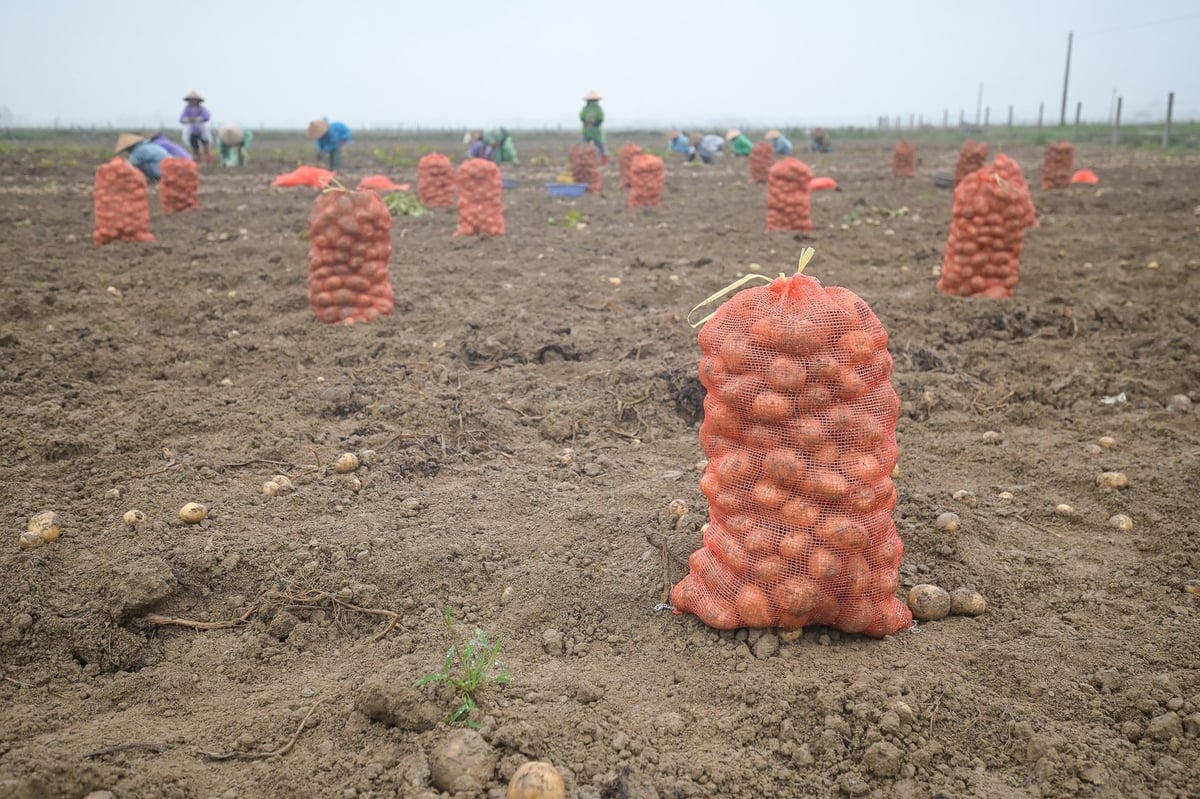May 29, 2025 | 22:23 GMT +7
May 29, 2025 | 22:23 GMT +7
Hotline: 0913.378.918
May 29, 2025 | 22:23 GMT +7
Hotline: 0913.378.918
Bac Ninh hosted the Conference on Realizing the Food Innovation Hub Vietnam (FIH-V) 2025 Plan on the morning of March 14. The PPP Working Group on Fruits and Vegetables and the Secretariat of the Vietnam Partnership for Sustainable Agriculture (PSAV) under the Ministry of Agriculture and Environment collaborated to organize the event.
The conference was organized to disseminate and deliberate on the implementation plan for the Food Innovation Hub Vietnam (FIH-V) 2025 initiative, which is being spearheaded by the Ministry of Agriculture and Environment. Furthermore, it offered a platform for the exchange of experiences and the visitation of a sustainable potato production model that integrates high-tech applications and low-emission cultivation.

Leaders of the National Agricultural Extension Center, PSAV Secretariat, PepsiCo and Syngenta Vietnam visit a sustainable potato growing model in Que Vo, Bac Ninh. Photo: Tung Dinh.
Established in 2010 under the "New Vision for Agriculture" initiative and the 20-20-20 goal (increasing productivity by 20%, reducing poverty by 20%, and cutting emissions by 20%), PSAV has been instrumental in the mobilization of investment resources, the application of scientific and technological advancements, and the development of effective and sustainable value chains for Vietnam's key agricultural commodities under the Public-Private Partnership (PPP) model.
PSAV currently maintains eight PPP Working Groups, including the PPP Working Group on Fruits and Vegetables, which is overseen by the National Agricultural Extension Center (public sector) in partnership with PepsiCo Foods Vietnam and Syngenta Vietnam (private sector partners). This organization has implemented novel methods of potato cultivation with the objective of increasing productivity, reducing environmental damage, and increasing the incomes of producers.
In 2024, the PPP Working Group on Fruits and Vegetables has implemented a series of innovative potato farming solutions, such as the use of drones to monitor the crop cycle and spray pesticides, precision irrigation systems, and fertigation techniques. Additionally, the group has implemented integrated pest management strategies.
These endeavors not only support Vietnam's COP26 commitment to achieving net-zero emissions by 2050, but also contribute to the implementation of the Sustainable Agriculture and Rural Development Strategy for 2021-2030, with a vision to 2050. The PPP Working Group on Fruits and Vegetables has become a pioneering force in the piloting of new technologies and innovations as a result of these advancements. Potatoes constitute the initial agricultural sector under the FIH-V initiative.

Potato productivity under the model of the PPP Working Group on Vegetables and Fruits increases by about 25-30% compared to traditional farming, and also reduces input costs. Photo: Tung Dinh.
Focused discussions on policy obstacles and challenges within the value chain in adopting innovation will be a feature of the conference in order to implement the FIH-V initiative in 2025. The working group's experts will also present plans to expand sustainable potato farming areas in northern Vietnam, following the successful 2024-2025 winter-spring crop season. They will also discuss the application of digital technology to improve crop management efficiency, the identification of production challenges and market constraints, and the proposed solutions to optimize the supply chain, reduce dependence on imports, and transition to a sustainable, modern, and highly competitive agricultural sector.
Nguyen Do Anh Tuan, Director General of the International Cooperation Department (Ministry of Agriculture and Environment) and Director of the PSAV Secretariat, expressed his admiration for the sustainable potato production and consumption model, which has tripled potato yields in comparison to traditional methods and nearly tripled the incomes of farmers.
According to him, the success of farmers enhances their capacity to integrate into the agricultural value chain, improves the quality of Vietnam's processed agricultural products, and provides market access to high-demand export destinations. He underscored that the Ministry of Agriculture and Environment's long-term commitment and pride are both reflected in this initiative.
In conclusion, the Director of the PSAV Secretariat conveyed his optimism for the continued strong collaboration with Syngenta Vietnam and PepsiCo Vietnam in the implementation of the Vietnam Food Innovation Hub (FIH-V) initiative in the years ahead.
PepsiCo, Syngenta, and key partners, including the National Agricultural Extension Center, Yara, Netafim_Khang Thinh, Novacid, Mimosatek, Viettransco, Duc Minh, USAID-Resonance (GDA project), and the "She Feeds The World" (SFtW) project by CAREVN, have collectively implemented the sustainable potato production project in the Central Highlands since 2019. The project has yielded exceptional results.
In 2024, the cultivation area will have increased by nearly fourfold to 1,700 hectares, from 400 hectares. The average yields will be 30-34 tons per hectare, which is substantially higher than traditional farming methods.
Building upon this success, the project participants have expanded the model to encompass 320 hectares in northern provinces during the winter-spring season of 2024-2025. The average potato yield increased by 8 tons per hectare compared to previous seasons, reaching 23-26 tons per hectare after just one season.

Leaders of the PPP Working Group on Vegetables and PSAV inspect the potato field. Photo: Tung Dinh.
Furthermore, the implementation of precision irrigation systems has resulted in a reduction in production costs, which equates to a 3,170 cubic meter water savings per hectare. The utilization of drones has resulted in a more than tenfold reduction in pesticide solution usage, while the integrated pest management approach has reduced the necessity for pesticide spraying by two applications per season. During the 2023-2024 winter-spring season, the previous pilot programs in Thanh Hoa and Hai Duong also attained remarkable results, with peak yields of up to 35 tons per hectare.
Le Quoc Thanh, Director of the National Agricultural Extension Center (Ministry of Agriculture and Environment), underscored the model's efficacy, stating, "The sustainable potato value chain, which is spearheaded by PepsiCo Foods, Syngenta, and their partners, not only serves as the foundation for the FIH-V initiative but also promotes green agriculture as global agriculture undergoes a significant transformation toward sustainability, emission reduction, and climate change adaptation." The objective of this initiative is to expand the model, incorporate cutting-edge technologies, and generate enduring value for the potato industry in Vietnam.
In the interim, Nguyen Viet Ha, the General Director of PepsiCo Foods Vietnam, reiterated the company's dedication: "PepsiCo is committed to the sustainable and environmentally friendly production of raw materials, in addition to the delivery of high-quality products, as a leading company in the processed food industry."
By broadening the sustainable potato value chain, we can ensure a consistent supply, establish a dependable raw material zone for our new factory in Ha Nam, and contribute to the advancement of a contemporary agricultural sector that minimizes environmental impact, in accordance with Vietnam's green development strategy.

Potatoes produced under the model of the PPP Working Group on Vegetables and Fruits are invested in by PepsiCo in seeds and output, while Syngenta supports technical support for pest and disease control. Photo: Tung Dinh.
Nguyen Thanh Tuan, Director of External Affairs and Sustainability at Syngenta Vietnam, emphasized the company's contributions as a significant player in pest management and crop protection: "Syngenta Vietnam has implemented sophisticated solutions to optimize production processes, improve efficiency, and assist farmers in implementing sustainable agricultural practices under the sustainable potato value chain model."
Translated by Linh Linh
/2025/05/25/4127-3-073637_820.jpg)
(VAN) Thanks to the promotion from an FAO-implemented project, vegetable production in greenhouses in Moc Chau has seen strong development, from 1.5 hectares in 2021 to nearly 50 hectares in 2024.

(VAN) FAO has recently supported USD 140,000 to implement the project 'Risk mitigation human-animal interface risks through disease control initiatives in pig farming.'

(VAN) The People's Committee of Tra Vinh province has approved an adjustment to the investment policy for the Green Hydrogen Plant project, increasing its area to approximately 52.76 hectares.
![Reducing emissions from rice fields: [2] Farmers’ commitment to the soil](https://t.ex-cdn.com/nongnghiepmoitruong.vn/608w/files/news/2025/05/05/dsc08881jpg-nongnghiep-140632.jpg)
(VAN) Clean rice cultivation model in Thuong Tan commune, Bac Tan Uyen district, is assisting local residents in achieving sustainable agriculture by substantially reducing costs, increasing productivity, and protecting the environment.

(VAN) At the conference to disseminate Resolution No. 68, AgriS introduced its digital agricultural ecosystem and reaffirmed its commitment to accompanying the Government in promoting private sector development and sustainable agriculture.

(VAN) 'Blue Ocean - Blue Foods' initiative is designed to restore marine ecosystems and establish sustainable livelihoods for local communities by cultivating a minimum of 1,000 hectares of cottonii seaweed in the first three years.
/2025/05/21/4642-3-112707_603.jpg)
(VAN) The V-SCOPE project has made direct contributions to three out of six pillars of the Comprehensive Strategic Partnership between Vietnam and Australia.